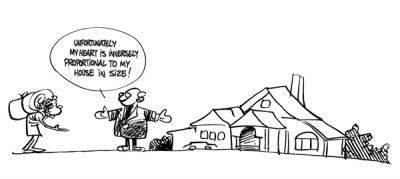‘We all want to help one another. Human beings are like that. We want to live by each other’s happiness – not by each other’s misery. We don’t want to hate and despise one another. In this world there is room for everyone. And the good earth is rich and can provide for everyone. The way of life can be free and beautiful, but we have lost the way.
Greed has poisoned men’s souls, has barricaded the world with hate, has goose-stepped us into misery and bloodshed. We have developed speed, but we have shut ourselves in. Machinery that gives abundance has left us in want. Our knowledge has made us cynical. Our cleverness, hard and unkind. We think too much and feel too little. More than machinery we need humanity. More than cleverness we need kindness and gentleness. Without these qualities, life will be violent and all will be lost….
The aeroplane and the radio have brought us closer together. The very nature of these inventions cries out for the goodness in men – cries out for universal brotherhood – for the unity of us all.’ (The Great Dictator, 1940)
I’m writing this as a person who at several times raised my hands in frustration at the lack of motivation from the Housing Industry in Mauritius, to embrace innovative ideas that would help to improve the speed, scale and quality of housing supply.
What actually happened in the Housing Industry in the last 10 years according to the Office of Public Sector Governance’s (OPSG) Report of November 2013?
Statistics showed that 1 out of 2 NHDC occupiers was unable to repay mortgage
Administrative cost of NHDC rose from 64M in 2009 to 77M in 2012
House buyers had to pay unnecessary overheads of 15% towards administrative cost
A record-low profit of 19.6 M for NHDC in 2012
An average of 473 housing units has been built annually between 2001 and 2012 instead of 1000 housing units per year
NHDC takes between 2 to 3 years to deliver a housing project
Housing units were of poor quality and unpopular. The NHDC has spent lots of money on waterproofing works, treatment of cracks, rehabilitation of water reticulation networks and site cleaning. Furthermore, the Catholic Church sent a ‘distress call’ to condemn the shoddy noddy boxes (Boîte d’allumettes) called family homes by NHDC which were pathetically small to house a family of 3 to 4 persons.
What was the cause for a ‘supply failure’ in housing over last 10 years?
According to the Office of Public Sector Governance’s (OPSG) Report of November 2013:
50% of NHDC occupiers cannot repay their mortgage on time
NHDC fixed administrative cost is high
Non-functioning of syndics
The process of identifying sites, designing, securing finance, launching tenders, supervision until completion takes two to three years
Furthermore, there was a wide gap between completion of a housing project and launching of a new one.
What will happen if NHDC occupiers are still unable to repay their mortgage in the future?
It will create a subprime mortgage crisis which consequently would lead to a vicious cycle within the social housing sector. The government will have to bail out the NHDC if they encounter any financial loss and the money will come from public funds, a repercussion on the whole society.
The scenario is as follows, if NHDC occupiers cannot repay their loan, they will be evicted and the houses will be sold by the NHDC to recover its cost. The former occupiers will be homeless again and the housing crisis will never be solved.
Therefore, in order to avoid another crisis, the government will have to offer interest rates cuts (no interest to pay on loan) or reschedule the loan on a longer period of time or even give a moratorium period (a time during the loan term when the borrower is not required to make any repayment). This means that government will have to assist 1 out of 2 NHDC occupiers financially in order to avoid their eviction.
In summary, the government has decided to build 2,000 housing units per year when they were already aware that NHDC housing units are no more affordable, making home ownership a distant dream for many. Because if housing was affordable, then why does the government has to offer financial incentives to NHDC debtors? The questions that many experts are asking are as follows: will the government be able to build 2,000 housing units without restructuring the NHDC as per recommendations of OPSG? Secondly, what are the measures taken to avoid mortgage arrears since 1 out of 2 NHDC occupiers are unable to repay their loan at present? Finally, if the government is already giving additional financial assistance to NHDC debtors, why can’t the government change its affordable housing policy from object subsidy to subject subsidy? In simple words, why can’t government give only people in housing needs, a housing allowance for them to rent or build the house of their choice? Maturing in the new ways does take time but we have the advantage of not inventing the wheel again. It has been done. Let’s commit and learn.
Can we solve the housing crisis?
EN CONTINU ↻



